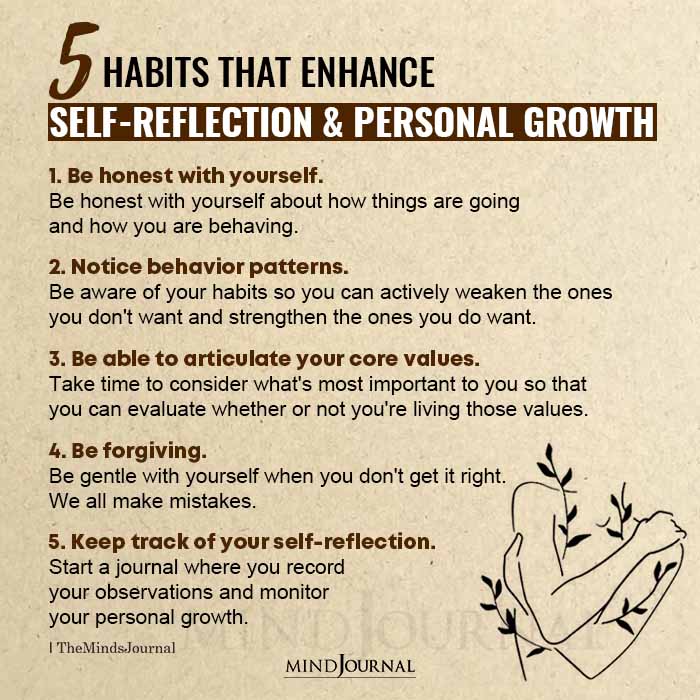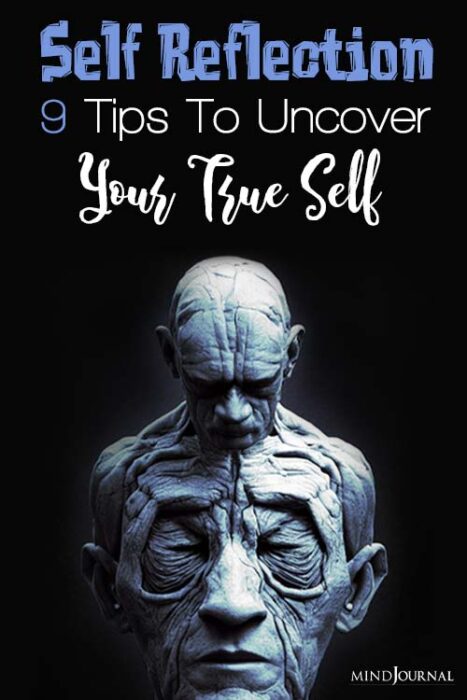Ever found yourself pondering over your thoughts, actions, and experiences? Have you ever taken a step back to examine your emotions, motivations, and personal growth? These moments of introspection and self-analysis are crucial for personal growth. Let’s explore what is self reflection in psychology and learn some self reflection tips.
What is Self Reflection in Psychology?
Self-reflection, in the realm of psychology, is a process of introspection where individuals examine their thoughts, feelings, and behaviors with a conscious and objective perspective.
It involves looking inwardly to gain a deeper understanding of oneself, identifying strengths and weaknesses, and recognizing patterns and habits that contribute to personal growth.
In this fast-paced world, self-reflection has emerged as a powerful tool for personal development and psychological well-being.

What Does It Mean To Self Reflect?
To self-reflect means to consciously and actively examine one’s thoughts, emotions, and behaviors. It involves internally exploring one’s experiences, beliefs, and values with an objective perspective.
Self-reflection goes beyond surface-level awareness and encourages a deeper understanding of oneself. It requires introspection, asking thought-provoking questions, and engaging in critical thinking. Through self-reflection, individuals gain greater self-awareness and the potential for positive change.
Now that we know what is self reflection and what does it mean to self reflect, let’s learn how to improve self reflection skills.
Related: 32 Thought-Provoking Questions That are Reflections on the Self
How to Practice Self Reflection
Self-reflection is an active process that requires intention and effort. It invites us to engage in critical thinking and embrace vulnerability to foster personal growth. Here are some helpful self reflection tips that can help you learn how to improve self reflection skills –
1. Creating Space for Self-Reflection
In our fast-paced lives, finding space for self-reflection can be challenging. It is crucial to create a safe and quiet environment where you can dedicate uninterrupted time to deep introspection.
This could be as simple as setting aside a few minutes each day or designating a specific location where you can retreat and focus solely on your inner world.
2. Cultivating Mindfulness
Mindfulness plays a vital role in self-reflection. By practicing mindfulness, we learn to observe our thoughts and feelings without judgment.
Mindfulness allows us to be fully present in the moment, consciously acknowledging our experiences and emotions as they arise. This heightened awareness paves the way for a more authentic and insightful self-reflection.
3. Journaling
One of the most effective ways to engage in self-reflection is through journaling. Putting your thoughts onto paper provides an opportunity to organize your ideas, explore your emotions, and gain clarity.
Set aside regular time to write freely, allowing your thoughts to flow without any fear of judgment or evaluation. Journaling can help you identify recurring patterns, track personal growth, and discover new perspectives.
4. Seeking Feedback and Perspective
Self-reflection doesn’t always have to be a solitary journey. Seeking feedback from trusted friends, mentors, or professionals can offer valuable insights that we may have overlooked.
Engaging in open and honest conversations with others allows us to gain different perspectives, challenge our assumptions, and broaden our understanding of ourselves.
Related: How To Do Shadow Work
5. Embracing Curiosity and Asking the Right Questions
Asking yourself thought-provoking questions is a fundamental aspect of self-reflection. By cultivating curiosity, we encourage deeper exploration of our thoughts, emotions, and behaviors.
Some questions to consider might include:
“What are my core values and how are they reflected in my actions?”
“What are my strengths and how can I leverage them?”
“What are my triggers and how can I manage them effectively?”
By asking the right questions, we invite self-discovery and pave the way for personal growth. This is how to practice self reflection.
6. Embracing Vulnerability and Self-Compassion
When you know what is self reflection, you realize that it can sometimes uncover uncomfortable truths or reveal areas where we fall short of our own expectations. It’s essential to approach these discoveries with self-compassion and a willingness to be vulnerable.
Embrace the idea that imperfection is a part of the human experience and that growth requires acknowledging our flaws. Treat yourself with kindness, understanding, and acceptance during the self-reflection process.
7. Setting Goals and Taking Action
Self-reflection becomes truly transformative when it leads to intentional goal-setting and action. Use the insights gained from self-reflection to set realistic and meaningful goals that align with your values and aspirations.
Break down these goals into actionable steps and hold yourself accountable for progress. Regularly revisit your goals and adjust them as needed based on your evolving self-reflection journey.

8. Establishing a Reflective Routine
Consistency is key when it comes to self-reflection. Establishing a reflective routine can help you make self-reflection a regular part of your life. Set aside dedicated time each day or week to engage in self-reflection.
It could be as simple as allocating 10 minutes in the morning or before bedtime to reflect on your day, your actions, and your emotions. By making self-reflection a habit, you create a space for continuous growth and self-awareness.
9. Incorporate Visualization Techniques
Visualization can be a powerful tool to enhance the process of self-reflection. Start by closing your eyes and visualizing a peaceful and serene place that resonates with you – a calming beach, a tranquil forest, or any other location that brings a sense of tranquility. Imagine yourself in this space, surrounded by stillness and serenity.
As you learn what is self reflection and engage in practicing it, visualize your thoughts, emotions, and experiences as if they were passing clouds or gentle waves. Observe them with detached curiosity, allowing them to come and go without clinging to them.
Visualization can help create a sense of detachment from your thoughts and emotions, enabling a more objective and insightful self-reflection experience.
Remember, self-reflection is a deeply personal and subjective experience. Personalize these self reflection tips to suit your individual needs and preferences. Embrace the process with an open mind and a willingness to explore your inner world.
Related: How To Figure Out What You Want In A Relationship
Takeaway
Self-reflection is a powerful tool that allows us to gain a deeper understanding of ourselves, our motivations, and our aspirations. By engaging in self-reflection, we can unlock personal growth, improve our relationships, and cultivate a greater sense of well-being.
Remember, self-reflection is a lifelong process that requires patience, commitment, and self-compassion. Embrace the journey within and empower yourself to become the best version of yourself through the power of self-reflection.
Through consistent practice and learning how to improve self reflection skills, you can unlock profound insights and cultivate self-awareness for personal development.
So, take a moment today, pause, and embark on the transformative journey of self-reflection. What awaits you is a world of self-discovery, growth, and fulfillment.
Related: How To Become Wise
Frequently Asked Questions (FAQs):
What is reflection and why is it important?
Reflection is the process of contemplating one’s thoughts, experiences, and actions. It’s important for self-awareness, personal growth, and learning from experiences.
What is the key to self-reflection?
The key to self-reflection is introspection, which involves examining one’s thoughts, emotions, and experiences with honesty and objectivity.
What is an example of self-reflection?
An example of self-reflection is journaling about your feelings and thoughts after a challenging situation to gain insights and perspective.









Leave a Reply
You must be logged in to post a comment.